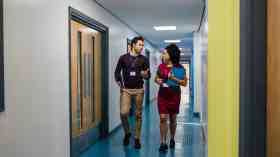Hygiene: It’s more important than you think
Studies into the importance of hygienic environments show that cleanliness has significant impact on the overall health, happiness and performance of staff, visitors and pupils.
This emerging evidence suggests that hygienic and clean environments create a sense of well-being and also impact upon positive attitudes, elevated performance (as measured by fewer health complaints), improved student attendance, teacher retention and overall higher test scores.
The British Institute of Cleaning Science (BICSc) discusses its investigation into the problems faced by facilities managers’ working in the educational sector and the simple steps that can be taken to improve hygiene levels in busy educational establishments.
Educating premises staff
In preparation for this article, BICSc contacted facilities managers from educational establishments across the UK to find out the main problems that they face when cleaning educational establishments (these individuals will remain anonymous for the purpose of this article). The feedback came from schools, universities and colleges with over 80 per cent of these indicating a need for hygiene and biohazard training for ‘daytime’ staff.
The problem is that many cleaning operatives carry out their cleaning and disinfecting duties first thing in the morning and last thing in the evening. Staff with developed knowledge of infection control methods do not necessarily manage the busy time in between the evening and weekend. For example, in accompaniment to day-to-day duties, premises staff are regularly responsible for the daily clean up of bodily fluids. This is particularly applicable to those who work within primary and secondary schools.
Needless to say, these types of incidents could have been avoided if staff were provided with suitable knowledge of infection control methods, without this knowledge of infection control, the threat of infection will still put schools in danger.
The Institute is able to provide Infection Control E-learning courses to staff that would benefit from awareness of the subject. These courses can be taken in their own time and at a low cost. Training enables learners to understand the key issues regarding infection control principles, including knowledge of the types of micro-organism that case infection, methods of transmission and transmission routes, knowledge of how to maintain a clean environment, infection control national policies and obligations, decontamination methods and waste handling practices.
Educating the young
Educating the younger generation about effective hygiene practices will also have a big part to play to make a cleaner future. Outbreaks like swine flu and bird flu have called for improved education about hygiene in schools and have encouraged further educating about hand washing, cleanliness and personal hygiene. Teaching acceptable hygiene principles is vital to creating life long habits, which will in turn, prevent illness and reduce the risk of spreading infection in years to come.
Unfortunately cross contamination can occur far too easily when cleaning operatives are unaware of the procedures that need to be undertaken to prevent the spread of infection. MRSA, E Coli, Clostridium Difficile and Legionnaires disease are an unfortunate result of poor cleaning standards. They continue to gain prominence in the media and as a consequence, industries are placing increasing demands on cleaning and hygiene-related activities.
With heightened awareness of public safety and public health potentially at risk, hiring cleaning operatives with ‘common sense’ alone is a big no! All cleaning operatives are recommended to have appropriate certification to prove that they are following standardised procedures.
Standardisation has been defined as a ‘framework of agreements to which all relevant parties in an industry or organisation must adhere to ensure that all processes associated with the creation of a good or performance of a service are performed within set guidelines’. Standardisation ensures consistency in the quality of goods produced and services delivered, to also facilitate comparison between products and services that are a like.
BICSc has played a fundamental part in the standardisation of cleaning skills across the globe for the past 53 years. For example, the BICSc colour coding system is instantly recognisable as a tool that prevents cross contamination when cleaning across different locations. The system suggests that all cleaning items, for example, cloths (re-usable and disposable), mops, buckets, aprons and gloves, should be colour coded.
Training for cleaning operatives also reduces client dissatisfaction and eliminates the need for ‘rework’. It also eliminates the hidden costs associated with time originally spent on tasks or original materials and equipment costs; it does this by addressing the most common reason for poor service delivery. Poor service delivery is usually the result of method failure or the application of incorrect techniques to the cleaning of elements within a facility.
The Institute produces a range of cleaning operative-focused standards. The key areas these cover are proficiency, competency and technical standards. Skills are encompassed by the BICSc Cleaning Proficiency Skills Suite (CPSS). The Institute’s training department BBS (BICS Business Services) facilitates training requests.
The risks of doing nothing
Along with the threat of infection and reduction in well-being, there is growing realisation of the links between hygiene and washroom standards and a wide range of negative health and behavioural issues. These include bladder problems, bowel problems, infections and diseases. Not only does this impact on the quality of life of the affected individual, but also creates further negative repercussions for society by creating unnecessary NHS expenditure in the long term.
Deteriorated conditions are preventable. Whilst there are costs associated with training staff, the environmental quality of a school and the health of staff, pupils and visitors should be high on educational establishments lists. This is just as important as effective nutrition and teaching standards.
Further information
www.bics.org.uk
Latest News
18/11/2025 - 09:28
Education Support, the charity dedicated to the mental health and wellbeing of teachers and education staff, has released its ninth Teacher Wellbeing Index.
17/11/2025 - 09:26
Nearly two thirds of Initial Teacher Training providers believe that teachers are not currently prepared to meet the government’s ambition to raise the complexity threshold for SEND pupils entering mainstream schools.
14/11/2025 - 11:04
England’s councils are warning of a "ticking time bomb" in the special educational needs and disabilities (SEND) system, with new data showing deficits that could bankrupt local authorities within three years.
13/11/2025 - 12:14
Event for school leaders, governors and education professionals relocates to the historic Old Billingsgate venue in London.
13/11/2025 - 09:49
The regulations have been set following a second consultation and detailed collaborative working with organisations and people across deaf and hearing communities.







